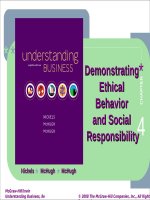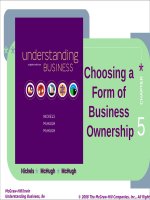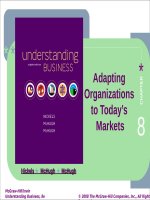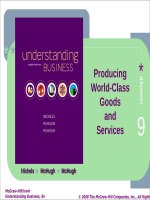Understanding business 11th by mchugh nickels chap017
Bạn đang xem bản rút gọn của tài liệu. Xem và tải ngay bản đầy đủ của tài liệu tại đây (3.76 MB, 49 trang )
CHAPTER 17
Understanding
Accounting
and
Financial
Information
McGraw-Hill/Irwin
Copyright © 2015 by the McGraw-Hill Companies, Inc. All rights reserved.
LEARNING OBJECTIVES
1. Demonstrate the role that accounting and financial
information play for a business and its stakeholders.
2. Identify the different disciplines within the accounting
profession.
3. List the steps in the accounting cycle, distinguish
between accounting and bookkeeping, and explain
how computers are used in accounting.
17-2
LEARNING OBJECTIVES
4. Explain how the major financial statements differ.
5. Demonstrate the application of ratio analysis in
reporting financial information.
17-3
JOHN RAFTERY
Patriot Contractors
• Served in the Marines and
used his G.I. Bill to study
accounting.
• Completed an
entrepreneurship program
for veterans and launched
Patriot Contractors.
• He credits his knowledge of
accounting with the growth
of his business.
17-4
NAME that COMPANY
Accounting software makes financial information
available whenever the organization needs it.
We specialize in software that addresses the
accounting needs of small businesses that are
often very different from major corporations.
Name that company!
17-5
WHAT’S ACCOUNTING?
LO 171
• Accounting Recording, classifying, summarizing
and interpreting of financial events and transactions in
an organization to provide interested parties needed
financial information.
• Outside parties like employees, owners,
creditors, unions, investors and the government
make use of a firm’s accounting information.
17-6
The ACCOUNTING SYSTEM
LO 171
17-7
ACCOUNTANTS’
RESPONSIBILITIES
LO 171
17-8
MANAGERIAL ACCOUNTING
LO 172
• Managerial Accounting Provides information
and analysis to managers inside the organization to
assist them in decision making.
• Managerial accounting is involved with:
- Costs of production
- Costs of marketing
- Preparation and control of budgets
- Minimizing tax liabilities
17-9
USERS of ACCOUNTING
INFORMATION
LO 172
17-10
FINANCIAL ACCOUNTING
LO 172
• Financial Accounting Financial information and
analyses are generated for people primarily outside
the organization. Outside users are interested in these
questions:
- Is the organization profitable?
- Is it able to pay its bills?
- How much debt does it owe?
• Annual Report A yearly statement of the financial
condition, progress, and expectations of the firm.
17-11
HOW to READ
an ANNUAL REPORT
LO 172
• Key things to watch for and read:
- Management’s
discussion and
analysis of operations
- Balance sheet
- Income statement
- Statement of cash
flows
- Auditor’s opinion
17-12
PUBLIC vs. PRIVATE
ACCOUNTANTS
LO 172
• Private Accountants Work in a single firm,
government agency, or nonprofit organization.
• Public Accountants Provide accounting services
to individuals or businesses.
• Certified Public Accountants (CPAs)
Accountants who have passed a series of
examinations established by the
American Institute of Certified Public Accountants (AI
CPA)
and met a states requirements for education and
17-13
experience.
WAYS to IMPROVE
ACCOUNTING PRACTICES
Source: www.soxlaw.com, accessed November 2014.
LO 172
17-14
DODDFRANK ACT
LO 172
• DoddFrank Wall Street Reform and Consumer
Protection Act increased financial regulation by
increasing the power of the Public Company
Accounting Oversight Board.
• Act was brought on by the recent financial crisis.
Photo Credit: Nancy Pelosi
17-15
AUDITING CHECKS ACCURACY
LO 172
• Auditing Reviewing and evaluating the information
used to prepare a company’s financial statements.
• Independent Audit An evaluation and unbiased
opinion about the accuracy of a company’s financial
statements.
• Certified Internal Auditors (CIAs) Accountants
who have a bachelor’s degree and two years of
experience in internal auditing and pass an exam
administered by the Institute of Internal Auditors.
17-16
ELEMENTARY,
MR. AUDITOR, ELEMENTARY
• Fraud damages businesses, no matter the size.
• The SEC has committed itself to fighting fraud but not
all auditors and CPAs are trained in finding fraud.
• Colleges are offering advanced degrees in forensic
accounting to meet the upcoming demand for these
accountants.
17-17
SPECIALIZED ACCOUNTANTS
LO 172
• Tax Accountants Accountants trained in tax law
and are responsible for preparing tax returns or
developing tax strategies.
• Government and Notfor
Profit Accounting
Support for organizations
whose purpose is not
generating a profit, but
serving others according to a
duly approved budget.
17-18
TEST PREP
• What’s the key difference between managerial
and financial accounting?
• How’s the job of a private accountant different
from that of a public accountant?
• What’s the job of an auditor? What’s an
independent audit?
17-19
The ACCOUNTING CYCLE
LO 173
• Accounting Cycle A sixstep procedure that
results in the preparation and analysis of the major
financial statements.
17-20
BOOKKEEPER’S ROLE
LO 173
• Bookkeeping The recording of business
transactions. Bookkeepers divide a firm’s
transactions into meaningful categories and post
them into a record book or computer program called
a journal.
• DoubleEntry Bookkeeping Bookkeepers
record all transactions in two places so they can
check one list of transactions against the other for
accuracy.
17-21
BOOKKEEPER’S TOOLS
LO 173
• Ledger A specialized
accounting book or
program where all
information is in one place.
• Trial Balance A
summary of all the
information in the account
ledgers.
17-22
TECHNOLOGY and ACCOUNTING
LO 173
• Computerized
accounting programs
post information
instantly and from
remote locations.
• Intuit’s QuickBooks
address the specific
needs of small
businesses.
17-23
TEST PREP
• How is the job of the bookkeeper different from
an accountant?
• What’s the purpose of accounting journals and a
ledger?
• Why does a bookkeeper prepare a trial balance?
• How has computer software helped businesses
in maintaining and compiling accounting
information?
17-24
FINANCIAL STATEMENTS
LO 173
• Financial Statement A summary of all the
financial transactions that have occurred over a
particular period.
• Key financial statements of
business are:
- Balance sheet
- Income statement
- Statement of cash flows
17-25









